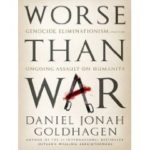By Rachel Ehrenfeld and Alyssa A. Lappen
Washington Times | February 14, 2006
What would you like to be when you growup?A Hamas children’s magazine has a clear answer: a terrorist. A children’s story it published calls upon small children and encourages them to commit terrorist acts and sacrifice their souls for Allah.
Western politicians who delude themselves in the belief that Hamas will change have only to consider what Hamas leaders say. On Feb. 3, Hamas chief Khaled Mash’al declared in Damascus: “Before Israel dies, it must be humiliated and degraded,” according to the Middle East Media Research Institute.
Hamas gives this message to the present generation. But they also ensure that the next generation of Palestinians, now growing up, receives this message as early as possible. Hamas TV shows impart children with the jihad message when they are toddlers. And for kids who have learned to read, there are magazine comics.
The children’s magazine named Fatah — Arabic for the Muslim who conquers the Kufir States — in its last two issues carried an illustrated story about the heroism of a very young but courageous Palestinian child, who is determined to be a jihad fighter like his older brothers.   The story demonstrates the indoctrination and “education” to which even the youngest of Palestinian children are exposed by Hamas in schools and publications.
The story was translated from the Arabic by Jonathan Dahoah Halevi of the Orient Research Group in Toronto: Here is the story.
The story begins when the child Basaal (meaning the “brave,” in Arabic) is exposed to jihad activities while watching television, reading newspapers and at meetings his brothers hold with their friends to plan fedayeen actions and to attack Israeli reconnaissance convoys. Fedayeen, in Arabic, means to sacrifice oneself for Allah.
The more Basaal sees and hears the jihad message, the more he internalizes it. One day, he decides that he wants to commit a fedayeen action for Allah against the “evil Zionists.” He says to himself, “I want so much to sacrifice myself by attacking the evil Zionists that stole our Dear Land.” Basaal’s father, who knows about his son’s desire, tries to cool his enthusiasm by promising to teach him how to be a fedayeen when he grows up. “You are still young. Take heart. Your older brothers are committing such acts, and when you grow up, I will teach you how to be a fedayeen.” The father and son close a deal by shaking hands.
Basaal goes to his little bed but can’t sleep. He is troubled by questions like, “When will I be able to sacrifice myself for Allah? When?” Then he has an idea, which he decides to carry out the following day.
Basaal waits impatiently for school to end. He rushes home, eats lunch and finishes his homework at breakneck speed. He takes binoculars from a closet and goes to the roof of his home to watch the nearby Israeli command post. He determinately tells himself, “I will observe the Zionists until the time is ripe for action.” After a few days, Basaal decides that he has enough information. Now, he must only to wait for the right moment to humiliate the Israelis.
On a night soon after, Basaal sneaks out of his home with a backpack and very carefully approaches the Israel Defense Forces post he has been observing. He creeps inside unnoticed. He then succeeds in his mission and returns home safely. The illustrations show him going to sleep happily, imagining the look on the Israeli faces when the soldiers realize what he has done in their base.
The next morning, an Israeli soldier, depicted as scared and shaking, arrives at his commander’s office. The officer, a lieutenant colonel, asks the soldier why he is so shaken. “Did you see Palestinian fighters?” The soldier replies, “Much worse than that.” The commander sends a group of well-armed soldiers to where Basaal carried out his mission. They discover a Palestinian flag hoisted inside the IDF base. The Israeli commander’s face turns bright red and is clearly horrified.
This is how “peaceful” Hamas brings the message of Khaled Mash’al alive for the Palestinian children.
Mr. Mash’al further clarified the violent and totalitarian Hamas agenda: “The nation of Muhammad is gaining victory in Palestine. The nation of Muhammad is gaining victory in Iraq, and it will be victorious in all Arab and Muslim lands.” We anxiously await the next issue of Fatah, to read of Basaal’s next “heroic” adventure.
Rachel Ehrenfeld is the director of American Center for Democracy and a member of the Committee on the Present Danger. Alyssa A. Lappen is a fellow at the American Center for Democracy.
All Articles, Poems & Commentaries Copyright © 1971-2021 Alyssa A. Lappen
All Rights Reserved.
Printing is allowed for personal use only | Commercial usage (For Profit) is a copyright violation and written permission must be granted first.






